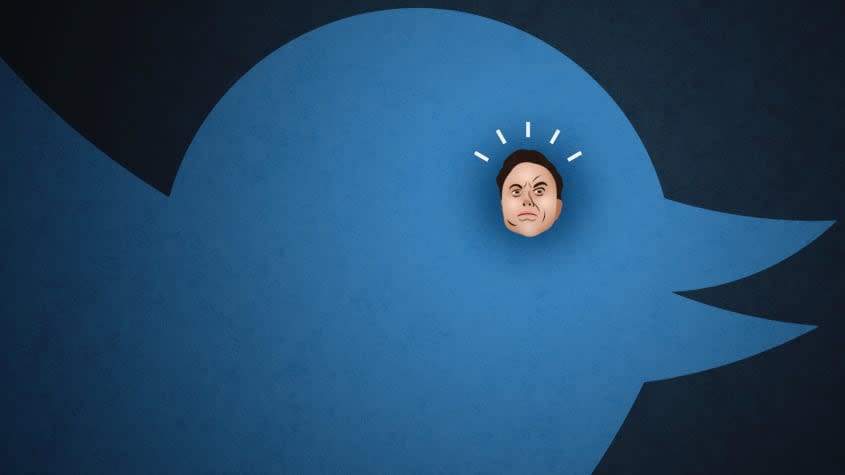Elon Musk takes over Twitter

- Oops!Something went wrong.Please try again later.
Elon Musk owns Twitter now. Months after he agreed to buy the social media site — and after an embarrassing lawsuit when he tried to back out of the deal — Musk took control of the company on Friday and immediately fired most of its senior management.
Other changes are coming, quickly. Musk and his new advisers "reportedly floated various trial-balloon ideas, including asking Twitter's power users and big accounts to pay for their blue-checkmark badges," Damon Beres and Charlie Warzel write at The Atlantic. And Musk's reputation as an advocate of free speech seems to have invited "a tide of slurs and racist memes" on Twitter over the weekend, Bloomberg reports. (That could invite a regulatory crackdown from the European Union, which limits such things.) But concerns about Musk's move range beyond misinformation and hate speech. "The world's richest man, worth more than the GDPs of many countries, is now in control of one of the world's most influential social networks," Seth Fiegerman writes at CNN. Can Musk make Twitter profitable, and can he do it while ensuring it remains a social media network that people want to use? Or is this just an out-of-control power trip?
Twitter is now a rich man's plaything
Elon Musk is rich and famous, which means he is "the exact type of person for whom Twitter is poison," Hamilton Nolan writes at The Guardian. The billionaire could let his works — PayPal, Tesla, SpaceX — speak for themselves but instead, he uses social media to reveal he's just another reply guy "easily seduced by the same sorts of ideas that grab the minds of Reddit-scrolling 13-year-old boys." But Musk isn't any different from Jeff Bezos who bought The Washington Post, or media barons like Rupert Murdoch and William Randolph Hearst, who created empires to bend public opinion to their will. "In truth, Musk probably bought Twitter for the same reason that sickeningly rich people throughout history have become press barons: to try to control the conversation."
Does Elon have too much power now?
There's a term for when oligarchs and big tech companies amass the power of nation-states: "Technopolarity." That's what Musk's purchase of Twitter signifies, Greg Sargent writes at The Washington Post: "The sovereignty that tech giants are carving out in international digital space is getting increasingly entangled in conflicts among sovereign nations." Musk's purchase of Twitter comes right after he threatened to pull the plug on Starlink internet service that Ukraine forces are using to repel Russian invaders from their territory, revealing his power to intervene in and upset international politics. His control over Twitter could have the same consequences. "One possibility is that Twitter becomes more hospitable to disinformation and online influence operations." Musk has done good things for humanity — his work at Tesla, making electric vehicles popular and desirable, is a genuine contribution to fighting climate change. So maybe good will come from his control over Twitter. "But it sure looks like we'll face seriously messy complications along the way."
Liberals are overreacting
"On the left, the reaction has been like something out of the Book of Revelation," The Wall Street Journal says in an editorial. But Musk faces genuine challenges in trying to make Twitter a healthy and profitable company. The deal saddles Twitter with $1 billion a year in debt interest payments — up from $50 million — which means Musk must figure out how to wring revenues from his new business. (Layoffs to cut costs have already started.) And there's another big decision: Whether to allow Donald Trump to reclaim his place on the platform, something that would be a "headache for Republicans" if the former president starts commandeering public attention again. But Musk would do well to start by making clear that unpopular opinions won't be "throttled" by the platform as misinformation. It's going to be a wild ride no matter what happens next. "Fixing Twitter might be Elon Musk's biggest challenge yet, and this is a guy who hopes to die on Mars."
Twitter won't become a free-for-all. Probably.
"Despite claiming to be a 'free speech absolutist', Musk has already conceded that some degree of content moderation is needed," Richard Waters writes for the Financial Times. So it's unlikely that the platform will suddenly run rampant with misinformation and hate speech — or at least, not more than usual. But Musk hasn't explained how Twitter could handle those issues better, and by firing most of the company's senior management "he seems doomed to repeat lessons Twitter has already spent many years learning." And he still has to figure out how to make Twitter into a profit-maker — the company has never been able to "break out of a relatively narrow business niche" aimed at information junkies. But the signs aren't great. After all, Musk overpaid for Twitter "in the midst of a tech stock downturn." Maybe he can turn to users to do content moderation, like Reddit, or perhaps companies that build their own services on Twitter could use the platform. It's clear in any case that Musk needs answers, and fast. "The reputation of the era's most successful entrepreneur is riding on the outcome."
You may also like
Department of Education releases new regulations revamping student loan relief programs
Bolsonaro refuses to concede Brazilian presidential election
7 terrifyingly funny cartoons about America's spooky political season

